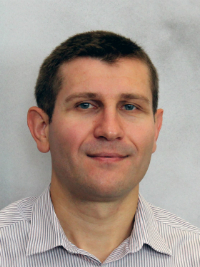- Professor, Industrial & Systems Engineering
- Liollio Family Faculty Fellow, Industrial & Systems Engineering
- Phone: 979-458-2333
- FAX: 979-847-9005
- Email: butenko@tamu.edu
- Office: ETB 4037
- Website: Research Website

Educational Background
- Ph.D., Industrial & Systems Engineering, University of Florida - 2003
Research Interests
-
Dr. Sergiy Butenko's research concentrates mainly on global and discrete optimization and their applications. In particular, he is interested in theoretical and computational aspects of continuous global optimization approaches for solving discrete optimization problems on graphs. Applications of interest include network-based data mining, analysis of biological and social networks, wireless ad hoc and sensor networks, and energy.
Awards & Honors
- Charles H. Barclay, Jr. Faculty Fellow, Texas A&M University College of Engineering, TAMU, 2012.
- Young Investigator Program Award, Air Force Office of Scientific Research, 2008.
- Favorite Professor of the Year”, IIE Student Chapter, Texas A&M University, 2006.
- Outstanding Teaching Assistant Award, ISE, University of Florida, 2002, 2003.
- Graduate Student Award for Excellence in Research, ISE, University of Florida, 2002.
- Outstanding International Student Award, College of Engineering, University of Florida, 2001.
Selected Publications
- J. Pattillo, N. Youssef and S. Butenko. On clique relaxation models in network analysis. European Journal of Operational Research 226 (2013), 9–18.
- Y. Wang, A. Buchanan, and S. Butenko. On imposing connectivity constraints in integer programs. Mathematical Programming, Ser. A (2017). To appear, DOI: 10.1007/s10107-017-1117-8.
- A. Verma, A. Buchanan, and S. Butenko. Solving the maximum clique and vertex coloring problems on very large sparse networks. INFORMS Journal on Computing 27 (2015), 164–177.
- A. Buchanan, J. Sung, S. Butenko, and E. L. Pasiliao. An integer programming approach for fault-tolerant connected dominating sets. INFORMS Journal on Computing 27 (2015), 178–188.
- B. Balasundaram, S. Butenko, and I. Hicks. Clique relaxations in social network analysis: the maximum k-plex problem. Operations Research 59 (2011), 133–142. ?